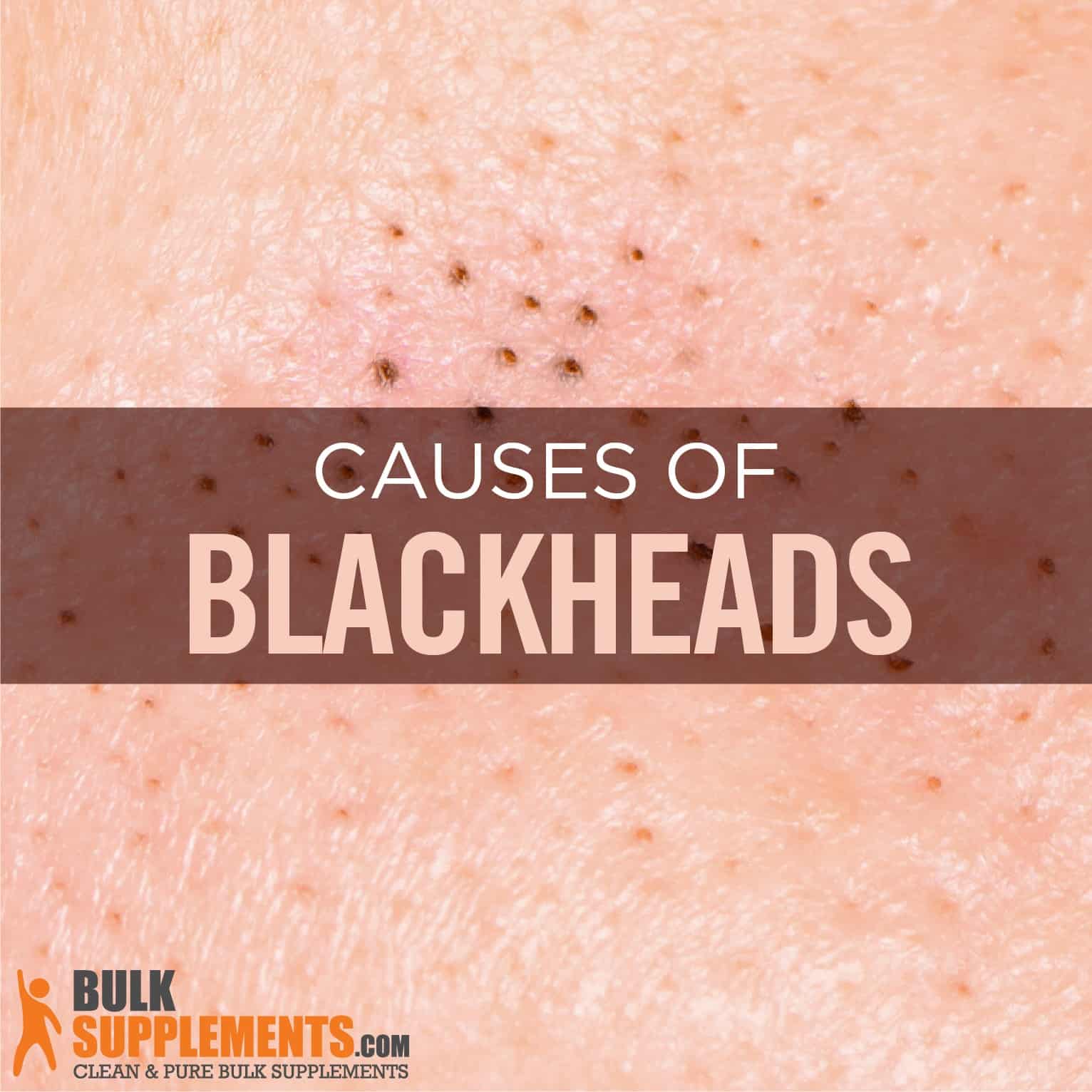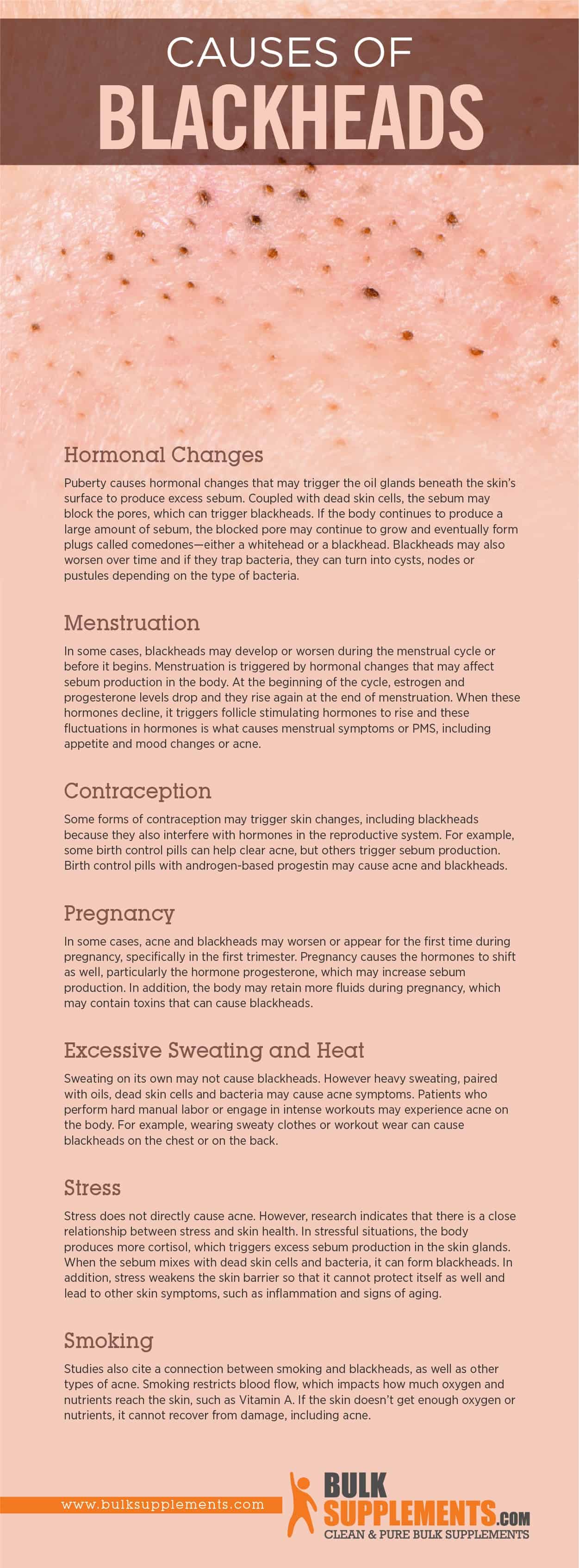Blackheads: Causes, Characteristics & Treatment
by James Denlinger Digital Marketing Strategist
What are Blackheads?
Blackheads are small, slightly raised lesions with dark tips that appear on the skin. Although they can develop on any part of the body, they are more common on the face and neck. These lesions are usually a feature of acne. However, they can appear without any other accompanying acne symptoms. Contrary to the common misconception that blackheads contain trapped dirt, they actually oxidized skin pigment called melanin.
One reason that patients may develop blackheads is hormonal changes if the skin produces more oil called sebum. Blackheads occur when sebum and dead skin cells block the skin’s pores. When the clogged substances come to the surface, they react to oxygen and turn black. Blackheads are not a serious medical condition and usually do not require any specific treatment because they do not cause bodily harm. However, most patients wish to remove blackheads and other acne symptoms for cosmetic purposes. Luckily, blackheads are preventable and treatable.
Characteristics of Blackheads
Although blackheads are a similar symptom, they are not the same as regular acne. For starters, blackheads are not inflammatory, which means that they do not cause any form of physical discomfort the way pimples can. They also have a lower texture than pimples.
Psychological Effects
Blackheads and other types of acne can significantly alter a patient’s physical appearance. It can even interfere with a patient’s social and emotional health. It can cause low-self esteem or poor self-image and may even cause depression and anxiety.
Blackheads vs. Sebaceous Filaments
Most of the time it can be hard to differentiate between blackheads and sebaceous filaments because they are both dark in color. In addition, both blackheads and sebaceous filaments often appear on oily areas of the skin like the chin and the nose. However, sebaceous filaments are entirely different from blackheads.
Unlike blackheads, sebaceous filaments are not a type of acne. In fact, they are a natural part of skin function that brings oil to it for moisture. Everyone has them and they do not cause any issues.
Sebaceous filaments are smaller than blackheads and they do not contain any dirt, oil, bacteria or dead skin cells. If someone squeezes a blackhead, it may extract fluid, but squeezing a sebaceous filament will not have the same effect. These may be irritating, but patients should not squeeze them because they are a natural part of skin function.
Causes & Triggers of Blackheads
Hormonal Changes
Puberty causes hormonal changes that may trigger the oil glands beneath the skin’s surface to produce excess sebum. Coupled with dead skin cells, the sebum may block the pores, which can trigger blackheads. If the body continues to produce a large amount of sebum, the blocked pore may continue to grow and eventually form plugs called comedones—either a whitehead or a blackhead. Blackheads may also worsen over time and if they trap bacteria, they can turn into cysts, nodes or pustules depending on the type of bacteria.
Menstruation
In some cases, blackheads may develop or worsen during the menstrual cycle or before it begins. Menstruation is triggered by hormonal changes that may affect sebum production in the body. At the beginning of the cycle, estrogen and progesterone levels drop and they rise again at the end of menstruation. When these hormones decline, it triggers follicle stimulating hormones to rise and these fluctuations in hormones is what causes menstrual symptoms or PMS, including appetite and mood changes or acne.
Contraception
Some forms of contraception may trigger skin changes, including blackheads because they also interfere with hormones in the reproductive system. For example, some birth control pills can help clear acne, but others trigger sebum production. Birth control pills with androgen-based progestin may cause acne and blackheads.
Pregnancy
In some cases, acne and blackheads may worsen or appear for the first time during pregnancy, specifically in the first trimester. Pregnancy causes the hormones to shift as well, particularly the hormone progesterone, which may increase sebum production. In addition, the body may retain more fluids during pregnancy, which may contain toxins that can cause blackheads.
Excessive Sweating and Heat
Sweating on its own may not cause blackheads. However heavy sweating, paired with oils, dead skin cells and bacteria may cause acne symptoms. Patients who perform hard manual labor or engage in intense workouts may experience acne on the body. For example, wearing sweaty clothes or workout wear can cause blackheads on the chest or on the back.
Stress
Stress does not directly cause acne. However, research indicates that there is a close relationship between stress and skin health. In stressful situations, the body produces more cortisol, which triggers excess sebum production in the skin glands. When the sebum mixes with dead skin cells and bacteria, it can form blackheads. In addition, stress weakens the skin barrier so that it cannot protect itself as well and lead to other skin symptoms, such as inflammation and signs of aging.
Smoking
Studies also cite a connection between smoking and blackheads, as well as other types of acne. Smoking restricts blood flow, which impacts how much oxygen and nutrients reach the skin, such as Vitamin A. If the skin doesn’t get enough oxygen or nutrients, it cannot recover from damage, including acne.

Treating & Preventing Blackheads
Blackheads do not necessarily require treatment because they do not cause any adverse physical health effects. However, they can have serious psychological effects and may interfere with self-esteem and self-confidence. If the condition is severe, dermatologists can prescribe topical medications or antibiotics to eliminate blackheads and other types of acne. In some cases, physicians may extract blackheads physically.
Avoid Extraction
One of the ways to worsen or further irritate a blackhead is to pick, scratch or pop it. Still, there may be temptation to find a tool to extract those blackheads, such as pore strips and masks. However, they also risk extracting other beneficial skin elements or damaging adjacent skin. Pore strips and masks can strip the skin of beneficial hair follicles and oils, which may irritate the skin and dry it out. The irritation may cause the skin to produce more oil, which may lead to more breakouts. Dermatologists use professional grade tools designed for blackhead extraction to remove them without damaging the skin.
Cleansing
Salicylic acid and benzoyl peroxide are two main active ingredients in skincare products, but they play different roles. The former removes dead skin cells that clog pores, while the latter fights bacteria. There are benefits and downsides to each ingredient, but they may both be good options to cleanse the skin and fight and prevent blackheads or other forms of acne. Speak to a dermatologist to determine which ingredient may be most effective.
It is also important to cleanse the skin regularly to remove excess oil or bacteria. However, there is a common misconception that more cleansing equals cleaner skin. But excessive cleansing can actually have the opposite effect. It can cause irritation, which may make acne worse.
Exfoliate Gently
Many people believe that exfoliating can have a negative effect on breakouts, including blackheads. However, exfoliation may actually eliminate dead skin cells that clog the pores. Gentle exfoliation may even remove existing blackheads. Consider using a soft skin brush to exfoliate to help remove dead skin. However, use it sparingly to avoid irritating the skin. Consult a dermatologist for advice on the best way to exfoliate.
Clay and Charcoal Masks
Clay or charcoal masks can help remove excess oils from the skin and extract bacteria or dead skin from the pores. They may eliminate blackheads or help prevent them. Again, consult a dermatologist first for advice or product recommendations.
Avoid Sleeping in Makeup
Sleeping in makeup may be a habit, but it is very harmful to the skin. If makeup stays on the skin overnight, it can clog the pores and cause blackheads. Oily cosmetic products can also cause excess oil on the skin and cause breakouts.
Supplements for Healthy Skin
Vitamin A
Vitamin A is present in a wide range of foods, including meats, fish, and dairy. It is also found in vegetables like carrots, apricots, yams, pumpkins and dark green vegetables. This vitamin helps promote eye, bone and skin health. It has antioxidant properties that can counteract free radicals and oxidative stress, which can trigger acne. In addition, it can also treat other skin conditions like psoriasis or keratosis pilaris. Vitamin A further cultivates healthy embryonic development in the womb. As a dietary supplement, the recommended dosage for Vitamin A palmitate powder is 30 mg a day. Consult a doctor before taking this supplement to avoid any complications or side effects.
Side effects are uncommon with the recommended dosage. However, exceeding the dosage may cause adverse side effects, including toxicity. In addition, Vitamin A may cause fatigue, loss of appetite, headache, flaky skin and even inflammation in the brain in some cases. Reduce the dosage in case you experience any of the side effects. Store the supplement in a clean area away from moisture, heat and light. Do not supplement with Vitamin A if you are pregnant or breastfeeding.
Zinc
Zinc is a natural mineral that encourages skin, digestive, immune and reproductive health. It also helps regulate hormones. If the body does not have enough zinc, it can lead to colds, infections, diarrhea and pneumonia. As a dietary supplement, the recommended intake for zinc gluconate powder is 225 to 450 mg once per day. Side effects are uncommon, if you adhere to the recommended dosage. However, pregnant women and those who are nursing should not take this supplement.
Discuss supplementation with a physician if you have diabetes, bleeding disorders or zinc allergies. In addition, do not take zinc with ginkgo biloba, especially in cases of bleeding disorders. Common side effects include itching and abdominal discomfort.
Krill Oil
Fish supplements contain omega-3, including krill oil. They are rich in amino acids, which boost cardiac, digestive and skin health. It also boosts the immune system by increasing a type of white blood cell called natural killer cells that fight help the immune system rid viruses. As a dietary supplement, the recommended dosage for krill oil softgels is two softgels up to three times a day.
Pregnant and nursing women should not use this supplement. In addition, krill oil is not recommended for those with a shellfish allergy. If it causes abdominal discomfort, reduce the dosage or take it with meals. Consult a physician before taking this supplement.
Bottom Line
Blackheads are a type of acne, a raised lesion characterized by a dark tip that results from oxidized melanin and a combination of dead skin cells and excess oil. There is no direct cause for blackheads, but there are several factors that may trigger them, such as menstruation, stress, excessive sweating, birth control or smoking. Blackheads do not cause any medical harm, so they do not usually require treatment. However, they can interfere with self-esteem and self-confidence. Fortunately, they are treatable and preventable. Dermatologists can prescribe topical treatments or antibiotics and there are tons of skin care options that may help. Consult a dermatologist for instructions or recommendations. Supplements may also help promote healthy skin and rid the body of bacteria. But they are not a replacement for medical treatment. Consult a doctor before starting a supplement regimen.
Sponsor Ads
Created on Mar 4th 2020 16:30. Viewed 419 times.



